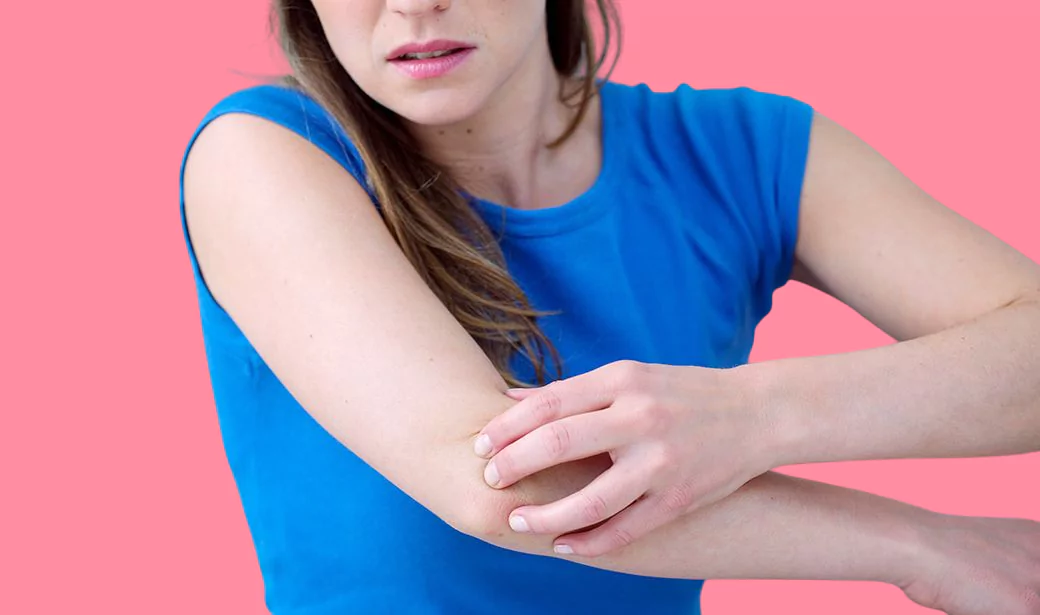Eczema is one of the most common skin diseases among women. It is a chronic inflammatory condition that causes severe dryness, itching, and redness of the skin.
Although it is not contagious, it can cause significant psychological and physical discomfort and affect a woman's quality of life and self-confidence.
What is eczema?
Eczema, also known as atopic dermatitis, is a chronic skin condition characterized by irritation resulting from a disruption of the skin's protective barrier, making it more susceptible to dryness and inflammation.
It often appears on the hands, face, neck, or behind the knees, and symptoms worsen during certain seasons, such as winter.
What are the symptoms of eczema in women?

Symptoms vary from case to case, but they often include:
- Extreme dryness of the skin.
- Redness and inflammation of the affected areas.
- Chronic itching that worsens at night or after bathing.
- Cracking of the skin, sometimes even bleeding.
- Thickening of the skin in chronic eczema.
- Dark spots after the inflammation heals due to constant itching.
The most common types of eczema among women
The types of eczema that affect women vary in their causes and manifestations. The most common are:
- Atopic eczema: This is the chronic form associated with genetic allergies.
- Hand eczema: Common among women due to frequent use of detergents and water.
- Contact eczema: Occurs as a result of contact with chemicals, perfumes, or metals.
- Seborrheic eczema: Affects the scalp or face and appears as greasy scales.
Causes of eczema in women
The most prominent causes and triggers of eczema are:
- Genetic factors: A family history of allergies or asthma.
- Severe dry skin: Due to frequent use of soap or hot water.
- Chemical and detergent substances: These cause skin irritation.
- Psychological stress and tension: These increase the severity of symptoms.
- Hormonal changes: Such as during menstruation or pregnancy.
- Cold or dry weather: This weakens the skin's natural hydration.
The Impact of Eczema on Women's Daily Life

Eczema is not limited to physical symptoms; it also significantly impacts a woman's psychological and social life. These effects include:
- Feeling embarrassed by the appearance of her skin.
- Insomnia and sleep disturbances.
- Anxiety and depression.
- Restrictions on daily activities.
- Decreased productivity.
What is the treatment for eczema in women?
Treatment aims to reduce inflammation and control symptoms, and includes:
- Regular moisturizing.
- Topical corticosteroids.
- Anti-itch and antihistamine medications.
- Antibiotics.
- Modern biological treatments.
- Psychotherapy or relaxation techniques.
Tips for prevention and reducing eczema flare-ups
There are many tips for preventing eczema, including:
- Use mild, chemical-free soap.
- Avoid hot water and long showers.
- Moisturize the skin several times daily.
- Wear soft cotton clothing.
- Avoid strong perfumes and irritating cosmetics.
- Consistently adhere to the treatment prescribed by your doctor.
Is eczema contagious?
No, eczema is not contagious at all because it is not an infection, but rather an immune-mediated skin condition.
Is eczema completely curable?
In most cases, it does not completely heal, but it improves significantly with treatment and adherence to skin care.
Can eczema affect pregnancy or breastfeeding?
It usually does not directly affect the condition, but a woman may need to adjust her treatment during pregnancy under the supervision of a doctor.
Article Summary
Eczema is a chronic skin condition that causes severe dryness and itching, which can affect a woman's psychological and physical well-being.
It is caused by genetic, environmental, or hormonal factors. Treatment involves consistent moisturizing, avoiding irritants, and using appropriate medications under the supervision of a doctor.
Paying attention to daily skin care is key to controlling symptoms and improving quality of life.